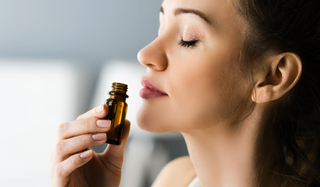Naturally London has always been a brand that values gently-scented products that deliver a subtle, pleasant aroma without overwhelming the senses. This approach recognises that fragrance isn’t merely decoration; for many people it’s part of the emotional experience of self-care.
By using well-chosen aromatic materials at moderated concentrations, “gently scented” helps maintain comfort, supports formula wearability (especially for sensitive noses or shared spaces), and honours safety considerations such as industry usage limits.
Understanding the Difference between Aromatherapy vs. Fragrance
What is Aromatherapy? “Aromatherapy” refers to the use of aromatic substances, traditionally essential oils, for wellness-oriented purposes (e.g., promoting relaxation, reducing state anxiety, aiding sleep). In practice, the key factor is the claim: when a product asserts therapeutic benefit beyond “smelling nice”.
What is Fragrance? In contrast, a fragrance is primarily designed to provide a pleasing sensory experience. A fragrance-enhanced cosmetic may say “will leave you feeling refreshed and lightly fragranced,” but unless it makes health or treatment claims it remains a cosmetic under many jurisdictions.
Why the Distinction Matters
Using “aromatherapy” language without the appropriate evidence or regulatory basis can mislead consumers and run afoul of cosmetic claims guidelines. It also sets inappropriate expectations: “smelling nice” and “therapeutically shifting mood or physiology” are different endpoints.
How Odor Affects Us
Our sense of smell is powerful. Each time you inhale a scent, it travels straight to the parts of your brain that shape emotion, memory, and even your heart rate. That’s why a familiar fragrance can feel comforting, grounding, or instantly calming. It’s biology at work, not imagination.
Research backs this up. Studies on inhalation aromatherapy show that certain scents, especially lavender can help ease feelings of stress or anxiousness in specific settings. The effects are usually gentle, not dramatic, but they point to something real happening between scent and the nervous system.
One key player is linalool, a compound found naturally in lavender and bergamot. It’s been shown in both human and animal studies to help promote relaxation by supporting the body’s calming pathways.
Interestingly, it doesn’t always matter whether a scent is natural or synthetic. What truly influences how we respond is the molecule itself, how much of it we inhale, and the context in which we experience it. That’s the essence of aromachology, the science of how scent affects mood and behavior.
What we do know for sure is that not every natural fragrance is automatically therapeutic, and more isn’t always better. An overpowering scent can actually feel uncomfortable or overstimulating, especially for those with sensitive senses. The magic lies in balance, a gentle scent that soothes without overwhelming.
Debunking Common Fragrance & Aromatherapy Claims
Claim 1: “If it smells, it’s aromatherapy.”
Reality: Smell does not automatically equal therapeutic benefit. Unless there’s credible evidence for a mood/physiology effect tied to the product’s aroma in its actual use context, the claim remains cosmetic. Regulatory frameworks hinge on intent + evidence. (See Regulatory & Claims.)
Claim 2: “Synthetic fragrance can’t affect mood.”
Reality: Not quite. Many aromachology studies show that odor stimuli from synthetic odorants (or identical molecules replicated synthetically) have measurable effects such as increased alertness or improved task performance. The brain responds to the molecule and context, not strictly “natural vs. synthetic”.
Claim 3: “Natural fragrance automatically means aromatherapeutic.”
Reality: No. “Natural” simply means derived from natural raw materials (per ISO 9235) or processed minimally—it does not guarantee a validated therapeutic effect. Each aromatic must be evaluated for efficacy, safety and use level.
Claim 4: “Natural always means safe.”
Reality: Also no. Some natural fragrances are phototoxic (e.g., citrus peel oils), sensitizing, or irritating—just like certain synthetics. Both domains require proper testing, safe formulation, and adherence to usage guidelines.
Can Natural Fragrances Provide an Aromatherapeutic Effect?
Yes, because certain natural aromatics (especially essential oils) include volatile compounds that inhaled or applied may influence mood and physiology.
But, this is not guaranteed simply because something is “natural fragrance.” For an aromatherapeutic effect you need:
The right aromatic molecule(s) with evidence of effect (e.g., linalool, limonene, eucalyptol)
An appropriate delivery method (inhalation, diffusion, topical) and concentration
A formulation and usage context as studied (population, setting, outcome).
A clear claim that reflects actual evidence
Finally, “natural fragrance” alone does not replace clinical care or therapeutic interventions. The effect is often supportive, mild, and context-dependent.
How Naturally London Keeps Things Thoughtful, Safe & Meaningful
Every fragrance choice is made with intention. Our products are designed to smell uplifting yet subtle never overpowering. The goal is to create a scent experience that feels gentle, grounding, and wearable in any space.
We believe in transparency about what gives each product its aroma. Naturally London uses carefully selected natural aromatic ingredients, and when needed, safe and approved synthetics that help maintain stability and balance. All formulations follow fragrance-industry safety standards.
Our approach to claims is honest and evidence-based. We celebrate the emotional comfort that scent can bring, but we only reference aromatherapeutic benefits when supported by credible research.
Every formula is built with safety first meeting IFRA standards and best practices to prevent irritation, sensitivity, or phototoxicity.
And most importantly, we design for real life. Scents that honor different sensitivities and environments. Each product offers a soft, inclusive experience that respects both your body and your surroundings.


